Edie Melson's Blog, page 9
July 13, 2025
How to Create an Effective One Sheet to Showcase Your Writing Project

by Larry J. Leech II @LarryJLeechII
While accepting pitches at two recent conferences, I noticed a disturbing trend—one sheets that are no longer a ‘one sheet.’
Almost all the one sheets were printed on the front and back. Unfortunately, most of the information was not relevant either.
This is two examples of what a one sheet should look like: Fiction One Sheet Nonfiction One Sheet
As you can see, all you need is the following:Title of your projectYour name Your contact info (I’ve seen a few one sheets that failed to include this information.)Three — or four — paragraph summary (Novelists, please include the ending. We, acquisition editors and agents, need to know how the story ends. Don’t end with a hook similar to your back cover copy or online description.)A short bio. Short. Like 80-100 words. Anything longer than that will decrease the word count for the summary.A headshotSome like to include an image related to the book. I think that helps. Otherwise, the one sheet ends up being a gray blob of words.
Now, for the honest, brutal truth. Please Do NOT Include the Following in a One Sheet:Market research / target audienceMarketing planA second summaryList of endorsersEndorsementsAll those items should be included in a book proposal, And, please, no color text. Black text is industry standard.
To confirm my suspicions about the recent shift in one sheets, I reached out to a handful of agents for their take. One said this: “I much prefer info on just one side….the point is brevity, and if you can’t get your pitch across on one side you haven’t refined it enough.”
Years ago, a top agent spoke to the writers group of which I was president. During his presentation he mentioned that he knew within ninety seconds if he wanted to represent a project. That was eye-opening for a lot of people. And he wasn’t being mean. Just honest.
Having the right information in a one sheet presented similar to the example in the link will better catch the eye of an editor or agent. My writing mentor taught me that ‘great writing is not what you leave in, but what you leave out.’ The same goes for the one sheet.
So, if you plan to pitch at a conference later this year, please make sure your one sheet is just that—a one sheet.
TWEETABLEHow to Create an Effective One Sheet to Showcase Your Writing Project from @LarryJLeechII on @EdieMelson (Click to Tweet)
 Usually with a hot beverage nearby, Larry J. Leech II spends his days working with words—as a writing coach of award-winning authors, as well as Acquisitions Editor and Master Book Coach for Illumify Media. More than forty years ago, Larry started his career as a sportswriter in southwestern Pennsylvania where he covered prep sports, college sports, and the Pittsburgh Pirates and Steelers. In 2004, after 2,300 published articles, Larry shifted to book publishing. Since that time, he has ghostwritten thirty books, edited more than 450 manuscripts, and coached hundreds of authors through the writing and publication process. For nearly two decades Larry has taught at numerous general market and inspirational conferences nationwide. When he has a minute, Larry likes to hang out on Facebook and Instagram. You can also find out more about him on his website: larryleech.com.
Usually with a hot beverage nearby, Larry J. Leech II spends his days working with words—as a writing coach of award-winning authors, as well as Acquisitions Editor and Master Book Coach for Illumify Media. More than forty years ago, Larry started his career as a sportswriter in southwestern Pennsylvania where he covered prep sports, college sports, and the Pittsburgh Pirates and Steelers. In 2004, after 2,300 published articles, Larry shifted to book publishing. Since that time, he has ghostwritten thirty books, edited more than 450 manuscripts, and coached hundreds of authors through the writing and publication process. For nearly two decades Larry has taught at numerous general market and inspirational conferences nationwide. When he has a minute, Larry likes to hang out on Facebook and Instagram. You can also find out more about him on his website: larryleech.com.
Published on July 13, 2025 22:00
July 12, 2025
Discover How to Infuse Power and Purpose into Your Writing When You Write for the One

by Martin Wiles @LinesFromGod
Let’s be honest. Who wants to write a book, short story, article, devotion, or blog post for just one person to read? And, yes, I’ve heard the reminder repeated in various forms on more than one occasion: “What you write may only be for the person sitting beside you.”
Pride makes that a challenging pill to swallow. I love it when thousands visit my website, but chafe when it dwindles to only a few.
For example, take Edward Kimball. Few have ever heard of him. In fact, he was only a Sunday school teacher teaching a room full of hyper boys. But he also wanted to see them enter a personal relationship with Jesus Christ, so he made that his mission by praying for them regularly.
One of those young boys didn’t seem to understand the gospel, so Kimball went to the store where the young man worked, stocking shelves. He spoke with him in the stock room, telling him how important it was to follow Jesus. The young man, Dwight L. Moody, accepted Christ.
Later, Moody became a great evangelist, preaching to thousands and seeing many come to follow Christ. One young man who made that decision was Wilbur Chapman. Not as well-known a name as D. L. Moody, he also became an evangelist who preached to thousands.
One day, a professional ball player had a Sunday off and decided to go hear Chapman preach. After hearing the message of salvation, he gave his life to Christ. His name was Billy Sunday, and he later became well-known for his evangelistic crusades. Under his preaching, a young man named Mordecai Ham decided to follow Christ and began preaching.
On one such preaching trip to Charlotte, North Carolina, Ham preached to a young man in the audience who vowed that he would not listen to Ham preach. But he eventually changed his mind and went. He accepted Christ as his Savior when he heard about what God had done through Christ. The world might not know Billy Frank, but they sure know Billy Graham. The power of the one. (https://www.travisagnew.org/2013/07/2...)
When I was a preacher boy in college, most preacher boys in training had dreams of grandeur. We would be the next Billy Graham. New and seasoned writers often have these same grandiose dreams: dreams that their writing, fiction or nonfiction, will make the bestseller lists, dreams that their book will win the Pulitzer Prize, dreams that their devotions and articles will be read by millions.
Of course, most of us never see that happen—me included—but we do influence someone. Jesus reminds us of this in his story of the Good Samaritan. It may have been just that, a story, but it had deep historical roots and meanings.
“Then a despised Samaritan came along, and when he saw the man, he felt compassion for him” (Luke 10:33 NLT).
Bad blood existed between Jews and Samaritans. For a Samaritan to help a Jew and for two Jews to pass by a fellow Jew because they were too busy was the utmost of insults. Had this been a true-to-life experience—and it could have been—we would never know the impact the one he helped might have had on others. Possibly, racial and cultural barriers would have tumbled.
Above everyone else, we must write for the One. Then, we must trust him to direct our work to the ones he knows need to read what we have written. This may only be one person, but most of the time, it entails many more. However, we influence each one, one by one.
God continually places “ones” in our lives. When we let go of pride and let God do what only God can do through our writing, we never know the power of the one we influence.
Ask God to help you write humbly for the “ones” he puts in your path. Never underestimate what God can do through that one.
TWEETABLEDiscover How to Infuse Power and Purpose into Your Writing When You Write for the One Martin Wiles (@LinesFromGod) on @EdieMelson (Click to Tweet)
 Martin Wiles lives in Greenwood, SC, and is the founder of Love Lines from God. He is a freelance editor, English teacher, pastor, and author. He serves as Managing Editor for both Christian Devotions and Vinewords.net and is an instructor for the Christian PEN (professional editor’s network). Wiles is a multi-published author. His most recent book, Hurt, Hope and Healing: 52 Devotions That Will Lead to Spiritual Health, is available on Amazon. He and his wife are parents of two and grandparents of seven. He can be contacted at mandmwiles@gmail.com.
Martin Wiles lives in Greenwood, SC, and is the founder of Love Lines from God. He is a freelance editor, English teacher, pastor, and author. He serves as Managing Editor for both Christian Devotions and Vinewords.net and is an instructor for the Christian PEN (professional editor’s network). Wiles is a multi-published author. His most recent book, Hurt, Hope and Healing: 52 Devotions That Will Lead to Spiritual Health, is available on Amazon. He and his wife are parents of two and grandparents of seven. He can be contacted at mandmwiles@gmail.com.
Published on July 12, 2025 22:00
July 11, 2025
Writer, Don’t Look Now, But You’re Being Followed
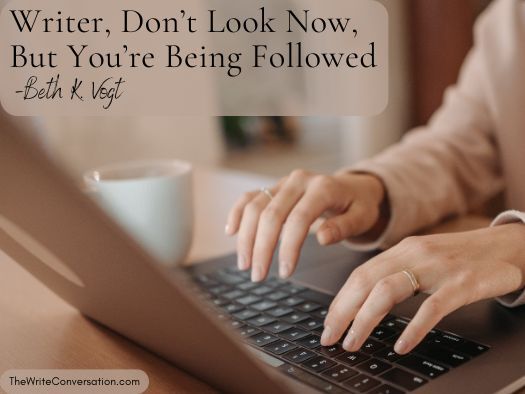
by Beth K. Vogt @BethVogt
Last weekend, my husband Rob and I attended the memorial service for our Aunt Jean, who died in June at 96. To be honest, she was Rob’s Aunt Jean, his mom’s younger sister, but years ago I claimed her as my aunt too. Both Rob and I treasured her as our mom-in-the-Lord.
Shortly after we arrived in Montana, Aunt Jean’s eldest daughter, Pat, shared something with me: a typed page titled “Thoughts—Obituary” dated May 15, 2009—yes, Aunt Jean had written this 16 years ago. She wrote a brief reflection of her faith journey, what she called “a pathway of discovery,” that transformed her life when she was 45 years old after she knew God in a true, personal way.
At the bottom of the page she’d written, “Beth Vogt said to me one day, ‘Leave a trail, Aunt Jean, so I can follow later.’”
Pat asked me, “Do you remember saying that?”
Yes, yes, I did.
Even though we were separated geographically because Aunt Jean lived in Montana and Rob’s military career moved our family both overseas and around the U.S., through the years Aunt Jean and I developed a strong relationship, thanks to phone calls, letters, texts, and all-too-rare visits. I trusted her. Listened to her. Her vibrant faith influenced mine and yes, I watched her—what she was doing and where she was going as she drew closer to our Father-God who she loved so much.
If you’re wondering, “What does all this have to do with writing, Beth?” stay with me, friend. I have a few questions for you.
Questions for Writers to Ask Themselves
1. Writer, where are you headed? I know we all have plans. Goals for the day, the week, the month, the year. To start a manuscript. To finish a manuscript. To enter a contest. To pitch a book at a conference. Stop for a minute and realize each day is another step toward eternity. As I grieve the “loss” of Aunt Jean, I remind myself that I haven’t lost her. I know exactly where she is. Because of her faith in Jesus, Aunt Jean stepped from this world right into his presence. Let’s reframe everything we want to accomplish within the timeframe of eternity.
2. Writer, who are you following? “Follow my example, as I follow the example of Christ.” (1 Corinthians 11:1 NIV) The apostle Paul exhorted other believers to follow him because he was imitating Jesus. I know my Aunt Jean loved God passionately. I knew I could learn about a live-out-loud kind of faith by watching her pursuit of closeness with Him, day by day. Who are you following because they encourage your faith? Who could you spend time with because they’d help you grow as a writer? Who lives out the values that are important to you?
3. Writer, who is following you? Each of us is leaving a path—intentionally or unintentionally. Have you looked back over your shoulder to see if anyone’s following you? Better yet, have you slowed down and left markers along your path so another writer can follow you? Each one of has the potential to mentor another writer. To encourage someone in their writing journey. To pray for them. You’re breaking new ground for someone. Be deliberate about it.
Leave a trail, my friend, so someone can follow you.
TWEETABLEWriter, Don’t Look Now, But You’re Being Followed from @BethVogt on @EdieMelson (Click to Tweet)
 Beth K. Vogt believes God’s best often waits behind the doors marked “Never.” She’s authored 15 novels and novellas, both contemporary romance and women’s fiction. Beth is a Christy Award winner, an ACFW Carol Award winner, and a RITA® finalist. Her newest contemporary romance novel, Dedicated to the One I Love, released June 20, 2023. Her novel Things I Never Told You, book one in her Thatcher Sisters Series by Tyndale House Publishers, won the 2019 AWSA Golden Scroll Award for Contemporary Novel of the Year. An established magazine writer and former editor of the leadership magazine for MOPS International, Beth blogs for Learn How to Write a Novel and The Write Conversation and also enjoys speaking to writers group and mentoring other writers. She lives in Colorado with her husband Rob, who has adjusted to discussing the lives of imaginary people. Connect with Beth at BETHVOGT.COM.
Beth K. Vogt believes God’s best often waits behind the doors marked “Never.” She’s authored 15 novels and novellas, both contemporary romance and women’s fiction. Beth is a Christy Award winner, an ACFW Carol Award winner, and a RITA® finalist. Her newest contemporary romance novel, Dedicated to the One I Love, released June 20, 2023. Her novel Things I Never Told You, book one in her Thatcher Sisters Series by Tyndale House Publishers, won the 2019 AWSA Golden Scroll Award for Contemporary Novel of the Year. An established magazine writer and former editor of the leadership magazine for MOPS International, Beth blogs for Learn How to Write a Novel and The Write Conversation and also enjoys speaking to writers group and mentoring other writers. She lives in Colorado with her husband Rob, who has adjusted to discussing the lives of imaginary people. Connect with Beth at BETHVOGT.COM.
Published on July 11, 2025 22:00
July 10, 2025
Professional Development for Writers

by Lilka Raphael @Lilka_Raphael
“Be not afraid of growing slowly; be afraid only of standing still.”— Chinese Proverb
Conference season is underway, yet many of us aren’t able to attend. However, there are multiple ways to expand our skills that don’t require the investment of a writers conference. Consider these alternatives that also enhance our knowledge.
Read As iron sharpens iron, exposure to excellent work makes our work better. The subconscious learning we acquire when reading is not to mimic other authors but to instead train our brains to dissect plot twists, character development, and pacing that engages readers. We expand our capacity to create new worlds and conjure unexpected surprises when we read writing that works. Successful people thrive under the tutelage of other successful people. Writers are no different. Reading is an easy and affordable way to learn and stimulate our creativity.
Prioritize fifteen minutes a day to “conduct research” if you feel pressed for time. This approach may motivate you to read more. There are countless books that expound on the fundamentals of writing. In addition, articles that illustrate how to use technology to write efficiently can help us increase our productivity. Whether reading for pleasure or publication, the more we read the better we write.
Online ClassesFew people achieve success without effort. Online classes are a convenient way to sharpen our skills. Everything from grammar updates (trends for publication change over the years) to marketing classes are available for those seeking traditional and self-publishing resources.
Scribophile, Reedsy Learning, and The Novelry are just a few sites that provide courses for online learning. Many colleges and universities offer classes and certificates in creative and technical writing. A Bachelor of Science degree in Professional Writing is also available for career oriented writers. Whatever development you seek, it is literally available at your fingertips. The quality and price points can vary, so diligently research your selections.
CritiquesCritique groups offer the camaraderie of other writers and safe spaces to receive feedback on our work. In person and online groups exist for practically every genre. Critiques challenge the authenticity of our characters, identify clichés, and offer alternatives to troublesome plots we may not consider.
Local writers clubs are great sources for critique partners. However, if you would rather meet online, there are free and paid sites available. Facebook is home to a myriad of groups for authors of varying expertise. Like dating, it may take time to find the right group for you, but the fellowship and feedback are priceless. Too introverted for a group? Consider one person you trust and start there. A candid critique partner can save hours in rewrites.
Keep writing, evolving, and learning new things. The best writers never stop seeking opportunities to hone their skills.
A wise man will hear and increase learning, And a man of understanding will attain wise counsel, Proverbs 1:5 NKJV
TWEETABLEProfessional Development for Writers from @Lilka_Raphael on @EdieMelson (Click to Tweet)
 A Florida native, Lilka Finley Raphael has been a licensed pharmacist for over thirty years. Her passions for writing, gardening, and photography prompted her to share her experiences and life lessons on her blogs B Is for Blessed and God, autism, & me. You can learn more about her at lilkaraphael.com
A Florida native, Lilka Finley Raphael has been a licensed pharmacist for over thirty years. Her passions for writing, gardening, and photography prompted her to share her experiences and life lessons on her blogs B Is for Blessed and God, autism, & me. You can learn more about her at lilkaraphael.comLilka’s greatest achievements are her two adult sons who have flown the nest. Happily married for thirty-two years, she lives east of Atlanta with her husband, Rod. They now share their home with two German Shepherds—Holly and Ivy—and one naughty kitty, Moxie.
Published on July 10, 2025 22:00
July 9, 2025
Common Word Choice Mistakes Every Writer Should Avoid
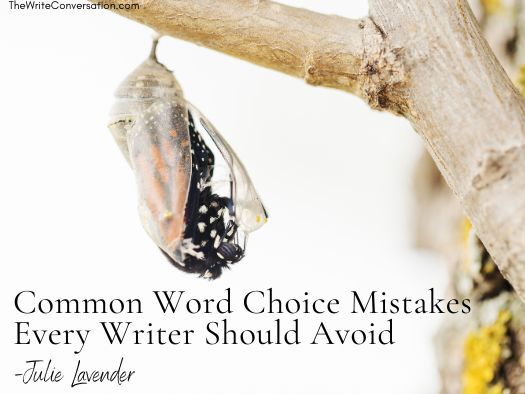
by Julie Lavender @JLavenderWrites
I want to share some common writers’ mistakes that drive my biologist-hubby nuts and my own almost-faux-pas
Do poisonous snakes live in your state?
The answer is “no.” No matter who you are or where you live, you have no poisonous snakes in your neighborhood, city, or state.
Want me to explain?
Poison is a toxin that is either eaten or touched. Cyanide, arsenic, and other poisons take affect when swallowed, ingested, or touched. Poison ivy and poison oak cause extreme itching and rashes with contact to the skin.
Venom, however, is injected. Consider the stinger of a scorpion or the fangs of snake. Venomous animals first puncture the skin of their victim. Then they inject venom into the wound that gets in the victim’s bloodstream.
The answer to my question? You have no poisonous snakes in your state, but you may very well have venomous snakes living nearby.
When book authors and scriptwriters substitute the word “poisonous” for the scientifically accurate word “venomous,” my biologist-hubby comes unglued.
My scientist husband also cringes when brilliant writers and filmmakers misidentify spiders. (I, on the other hand, cringe … or maybe screech loudly when I encounter one of those critters!)
For example, take this line from one of my very favorite movies, Sleepless in Seattle.
Tom Hanks plays the role of widower Sam Baldwin. His son, Jonah, attempts to disrupt the first date Sam’s had since Jonah’s mother passed away. To thwart a kiss, Jonah lets loose an ear-piercing scream. (Much like the ones that involuntarily erupt from my mouth every time I see a snake – venomous or harmless—or a spider—all harmful in my mind.)
Jonah covers by saying, “I thought I saw a black widow spider.”
Sam Baldwin replies, “Next time you think you see a black widow spider, say, ‘Dad, excuse me but I believe a poisonous insect is in the house’ and I will calmly take care of it.”
Now let me tell you—this line about sent David over the edge. First, Tom Hanks should’ve used the word venomous, and second, spiders are arachnids, not insects.
Another one that causes my husband angst? I’ll ask you a question instead.
Have you ever watched a butterfly emerge from its cocoon?
I’m sure you’ve figured out that this is a trick question. No, you’ve never ever watched a butterfly exit a cocoon.
A butterfly caterpillar forms a chrysalis to undergo the pupal stage that results in the transformation from caterpillar to butterfly. Moth caterpillars form cocoons for their transformations.
You’d be amazed—and probably surprise—how many children’s picture books incorrectly use the word cocoon when addressing the miraculous change that takes place from caterpillar to butterfly.
Before I became the wife of a biologist, I used each one of these terms incorrectly. It’s easy to do. But it shouldn’t happen to writers of books, articles, blog posts, or scripts. Writers are responsible for verifying our facts and words before sending them into the world. If you write about animals or critters, get a biologist or zoologist to read your work.
If you’re quoting facts or sharing information about building a house, get a contractor or architect to check over your words. Sports manuscript or medical article? Check with a coach or medical professional before attempting publication.
You get the idea.
Now let me tell you about my own faux pas, and it has nothing to do with science. When I wrote my picture book, A Gingerbread House, I penned this line: “The bakers used frosting to prop up the wall. First this side, then that side—all four standing tall.”
All my life, I’ve “frosted” cakes and cookies. Maybe it’s a southern thing or maybe it was simply erroneous. Fortunately, I consulted an avid gingerbread builder and competitor before submitting my manuscript. She kindly told me the correct gingerbread term should be icing, not frosting.
I sure dodged a sticky mess with that one!
Moral of the story? Whatever you’re writing, make sure to vet your words with an expert. You’ll be glad you did! And my husband will appreciate the gesture as well.
What about you? Are there words in your profession misused by others that make you cringe?
TWEETABLECommon Word Choice Mistakes Every Writer Should Avoid from @JLavenderWrites on @EdieMelson (Click to Tweet)
 Even after close to 42 years of marriage to a snake-loving, spider-loving, critter-loving biologist, Julie Lavender remains frightened of most of the creepy crawlies she encounters. “I’ve gained an appreciation for those scary guys, thanks to my husband,” she says. “But that doesn’t make me less afraid of them.” Julie and David write together and try to use correct terminology so as not to cause anyone to cringe while reading their work. They are the authors of Raising Good Sons: Christian Parenting Principles for Nurturing Boys of Faith and Character published by Penguin Random House and books about venomous animals and gingerbread houses, though not between the same book cover.
Even after close to 42 years of marriage to a snake-loving, spider-loving, critter-loving biologist, Julie Lavender remains frightened of most of the creepy crawlies she encounters. “I’ve gained an appreciation for those scary guys, thanks to my husband,” she says. “But that doesn’t make me less afraid of them.” Julie and David write together and try to use correct terminology so as not to cause anyone to cringe while reading their work. They are the authors of Raising Good Sons: Christian Parenting Principles for Nurturing Boys of Faith and Character published by Penguin Random House and books about venomous animals and gingerbread houses, though not between the same book cover.
Published on July 09, 2025 22:00
July 8, 2025
Want to Always Be Productive? Heed My Top 10 List of What NOT To Do for Writers and Writing
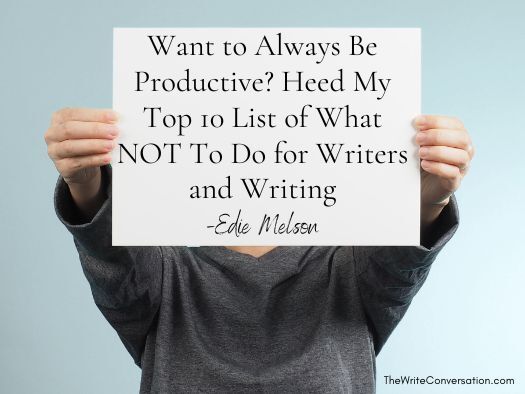
by Edie Melson @EdieMelson
Everywhere a writer turns we're hit with things we should do, things we have to do, and things we must do. The lists seems endless and can lead to frustration, discouragement, and burnout.
To combat this, I spend some time taking an honest look at all the things on my plate. When I've done this, I inevitably find that just like piling on too much at a family potluck, my plate is overloaded.
It’s funny, but the worst offenders always turn out to be the things I really shouldn’t have added in the first place—things others have said I should do. So today I’m sharing what I discovered. And by the way, discovering these was painful for me too!
10 Things on My NOT-TO-DO List for Writers
1. Beginning without prayer. Before my fingers hit the keyboard, I try to always remember to pray first. The times when I don't begin with prayer are almost one-hundred-percent of the time less productive.
Rejoice always, pray without ceasing, give thanks in all circumstances; for this is the will of God in Christ Jesus for you. 1 Thessalonians 5:16-18 ESV)
2. Stop worrying about results. I’m a control freak and spend the most mental effort trying to affect outcomes instead of pouring energy into the work itself. I will be obedient with what God has given me (time, ideas, resources, etc.) and I will leave the results up to Him
The heart of man plans his way, but the LORD establishes his steps. (Proverbs 16:9 ESV)
3. Quit comparing. So what if Susi Author has 25,000 Instagram followers or Jason Writer finaled in the most recent contest? God has a plan for MY writing that doesn’t look like anyone else’s. I need to focus on that, not what is happening to everyone.
For where envy and selfish ambition exist, there is disorder and every kind of evil. (James 3:16 HCSB)
4. Stop shortchanging time with God. I’ve learned that when I’m over loaded the LAST thing I need to do is skimp on reading the Bible, praying and spending time with God.
But seek first the kingdom of God and his righteousness, and all these things will be added to you. (Matthew 6:33 ESV)
5. Don’t work even harder. But stressed makes me want to work longer hours to get caught up. That’s a trap. Instead, when life caves in, rest and joyful activities are even more important. We can’t get water from a dry well.
And he said to them, “Come away by yourselves to a desolate place and rest a while.” For many were coming and going, and they had no leisure even to eat. (Mark 6:31 ESV)
6. Stop relying on your own strength. This goes hand in hand with #4 above. All my inspiration, talent and knowledge comes from God. It’s HIS strength that gets me through the hard times.
Do not fear, for I am with you; Do not be afraid, for I am your God. I will strengthen you, I will also help you, I will also uphold you with My righteous right hand.’ (Isaiah 41:10 NASB)
7. Don’t give head-space to doubt and fear. I have learned that when I’m stressed, Satan comes after me swinging hard. And one of the first traps he sets is with doubt and fear. When life is difficult is NOT the time to rethink your calling or stop because you’re afraid. Instead it’s time to remember God’s call and move forward in faith.
For the gifts and the call of God are irrevocable.(Romans 11:29 NET)
8. Stop working in chaos. When I get overwhelmed, I get mentally messy and scattered. I’ve found that’s when I need to stop, make a list and prioritize. I look at my schedule and figure out what I actually time I actually have and how I can use it most effeciently.
For God is not a God of disorder but of peace—as in all the congregations of the Lord’s people.(1 Corinthians 14:33 NIV)
9. Don’t anticipate trouble. When I’m stressed, I often slip into a negative mindset and find myself assuming the next email/phone call/message will be more problems. When I quit looking for trouble, it’s easier to dig my way out of an overloaded season.
So then, do not worry about tomorrow, for tomorrow will worry about itself. Today has enough trouble of its own. (Matthew 6:34 ESV)
10. Quit assuming it’s always going to be this way. When I’m in a hard season, I tend to feel like things are never going to get better. I need to remember life hasn’t always been this way and there will come a time when it will get easier.
Because of the Lord’s faithful love we do not perish, for His mercies never end. They are new every morning; great is Your faithfulness (Lamentations 3:22-23 HCSB)
The life of a writer has seasons—some are easy and some are more difficult. The one constant in our lives is God. Where ever we are, He is with us. The most important thing to remember is not to get caught up looking at the problems and instead look up. Whatever we’re facing, He’s already got a plan.
This is my NOT To Do List, what would you add to it?
Don’t forget to join the conversation!Blessings,Edie
TWEETABLEWant to Always Be Productive? Heed My Top 10 List of What NOT To Do for Writers and Writing @EdieMelson (Click to Tweet)
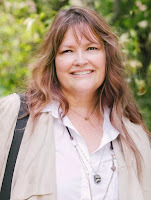 Edie Melson is a woman of faith with ink-stained fingers observing life through her camera lens. She’s a writer who feels lost without that device & an unexpected speaker who loves to encourage an audience. She also embraces the ultimate contradiction of being an organized creative. She knows the necessity of Soul Care and leads retreats, conferences & workshops around the world on staying connected to God. Her numerous books, including the award-winning Soul Cares eries & reflect her passion to help others develop the strength of their God-given gifts. Her blog, The Write Conversation is recognized as one of the top 101 industry resources.
Edie Melson is a woman of faith with ink-stained fingers observing life through her camera lens. She’s a writer who feels lost without that device & an unexpected speaker who loves to encourage an audience. She also embraces the ultimate contradiction of being an organized creative. She knows the necessity of Soul Care and leads retreats, conferences & workshops around the world on staying connected to God. Her numerous books, including the award-winning Soul Cares eries & reflect her passion to help others develop the strength of their God-given gifts. Her blog, The Write Conversation is recognized as one of the top 101 industry resources. She and husband Kirk have been married 40+ years and raised three sons. They live in the foothills of the Blue Ridge Mountains and can often be found hiking—with Edie clinging to the edge of a precipice for the perfect camera angle and Kirk patiently carrying her camera bag and tripod. Connect with her on her website, WWW.EDIEMELSON.COM and through social media.
Published on July 08, 2025 22:00
July 7, 2025
Writing a Meaningful Book Review
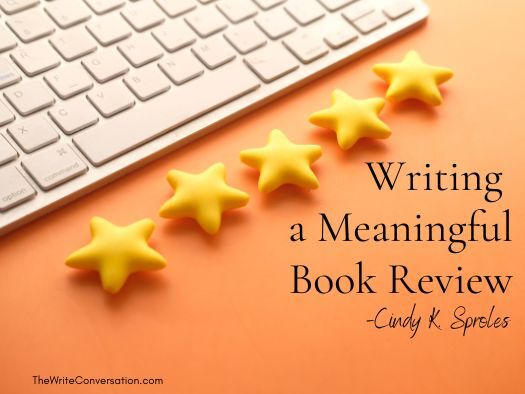
by Cindy K. Sproles @CindyDevoted
Book reviews. They’re the lifeblood of the reader—and the author. Authors need them to push them up into the Amazon eye, while readers want to know about the book. Is it worth their time, money, and effort to purchase and read? Both are valid needs and equally important. But how do we pen a useful book review? You may ask, “Is it useful?” And the response is yes. There’s a difference between an author-written book review and a useful book review.
When I troll through the reviews on a few of my books, I can spot an author-written review in a split second. Authors tend to review the entire story, including the plot and characters, and let the world know if the author did a good job mechanically (plus they recount the entire story). That is not a book review, in my opinion—it’s a critique.
As you begin to write a review, remember the reason. A review is a way to let other readers know if you enjoyed the book or if you felt it was a disappointment. That’s all the reader wants to know. They don’t want you to divulge every little detail and plot point. They don’t care about mechanics or arc. So, as we progress through this post, I’m going to give you some pointers on how to really write a book review and show you an example. Now, keep in mind that I am not the be-all and end-all of writing reviews, but I think you will see a difference.
A review should demonstrate how a book impacted you. Did you like it? Was it memorable? Did it move you? Were the characters ingrained in your mind so that you missed them when the book was done?
I read a quaint little book written by German author Carsten Henn called The Door-To-Door Bookstore .
I began my review like this:
…The cover drew me in immediately with its bright colors and embossed parts, which, as I ran my hand over it, made the book almost seem alive. I pulled the book to my face and took in the smell. Perfect. Then opened it to the first page and read.
Carsten Henn, the author, immediately took me to Germany and inside the doors of an old, yet ornate, bookstore. Wooden shelves with fancy carving, books neatly stacked, and a bookseller who loved the stock. The archaeology of this store said, "I'm old, but I'm here to stay." And I was immediately captivated.
I didn’t need to tell the reader every character. Instead, I told them why I picked the book up in the first place and then what happened when I opened it to the first page. I didn’t need to break the story down into writing details that the regular reader couldn't care less about. I filled it with the reasons why I purchased the book—information readers want to know.
Next, I filled it with nuggets that hopefully made the reader want to read the book. Sometimes, as authors, we spend far too much time detailing the story instead of sharing the relationship of the story. Sometimes we put down the writer’s pen and pick up the reader's desire.
I rarely label a book with anything other than good, excellent, or not so good, simply because I can’t bear to disappoint or overbuild a reader’s expectations. Still, The Door-to-Door Bookstore had taken me, yanked me inside, and refused to let me leave before I met the characters and the heart of Carl. Thumbing through the chapters, I noticed word count didn’t mean anything to Mr. Henn, nor did page length. He only wanted me to walk the cobblestone road to the homes of the “quirky” at best, customers of Carl. You see, Carl hand-delivered books to clients who were a little odd. He met a little girl, who, despite his efforts to rid himself of her, insisted he would be her friend. There were moments when I laughed out loud at the determination of this little girl. If we could all only have such tenacity.
Still, the book was about books. Yeah, I know. A book about books. About readers. About how an aging bookseller cared for his patrons. The more I read in this little masterpiece, the more I wanted to walk arm-in-arm with Carl. The more I wanted to meet the odd readers he strove to be sure their reading needs were met.
The key to selling books is to convince the reader that the story is worth reading, not to break apart every plot point. Remember this when you write a review. If you loved a book, make the readers love it too. That’s the purpose of a book review. If you dislike a book, don’t be mean, but pick out things that were good and simply let the reader know this wasn’t a book that met your expectations. Again, that’s all the reader cares about.
After you finish this little gem, take time to know people. Meet them, engage them, and maybe, just maybe, you’ll become like Carl the bookseller—excited to turn the page of a person and see how their story impacts you, or more so, how your passion, love, and caring impact them.
Perhaps my suggestion on how to write a useful book review will fall on deaf ears, but I hope not. As an author, don’t forget why you write. Don’t lose sight of “story” and of the relationships that are formed through reading. When you write, every word should be poured over, thought through, tweaked so that the love you write them with is conveyed to the reader. And then, when you write your next book review, remember those same things. Share why you loved the story and what made you fall in love with it. Move your readers so they cannot help but purchase the book. Sometimes we’re too sterile. Too “authorish.” After all, why do you write? We should write to love our readers into loving to read. Something to ponder on that next book review.
TWEETABLEWriting a Meaningful Book Review from @CindyDevoted on @EdieMelson (click to tweet)
 Cindy K. Sproles is an author, speaker, and conference teacher. Having served for a number of years as a managing editor for Lighthouse Publishing of the Carolinas and Ironstream Media, Cindy now works as a mentor, coach, and freelance editor. She is the co-founder of Writing Right Author Mentoring Services with Lori Marett and she is the director of the Asheville Christian Writers Conference. Cindy is also the co-founder of Christian Devotions Ministries and WWW.CHRISTIANDEVOTIONS.US, as well as WWW.INSPIREAFIRE.COM. Her devotions are in newspapers and magazines nationwide, and her novels have become award-winning best-selling works. She is a popular speaker at conferences and a natural encourager. Cindy is a mountain girl, born and raised in the Appalachian mountains, where she and her husband still reside. She has raised four sons and now resorts to raising chickens where the pecking order is easier to manage. You can visit Cindy at WWW.CINDYSPROLES.COM or www.wramsforwriters.com.
Cindy K. Sproles is an author, speaker, and conference teacher. Having served for a number of years as a managing editor for Lighthouse Publishing of the Carolinas and Ironstream Media, Cindy now works as a mentor, coach, and freelance editor. She is the co-founder of Writing Right Author Mentoring Services with Lori Marett and she is the director of the Asheville Christian Writers Conference. Cindy is also the co-founder of Christian Devotions Ministries and WWW.CHRISTIANDEVOTIONS.US, as well as WWW.INSPIREAFIRE.COM. Her devotions are in newspapers and magazines nationwide, and her novels have become award-winning best-selling works. She is a popular speaker at conferences and a natural encourager. Cindy is a mountain girl, born and raised in the Appalachian mountains, where she and her husband still reside. She has raised four sons and now resorts to raising chickens where the pecking order is easier to manage. You can visit Cindy at WWW.CINDYSPROLES.COM or www.wramsforwriters.com.
Published on July 07, 2025 22:00
July 6, 2025
The Writing Conference is Over, Where Do I Begin?
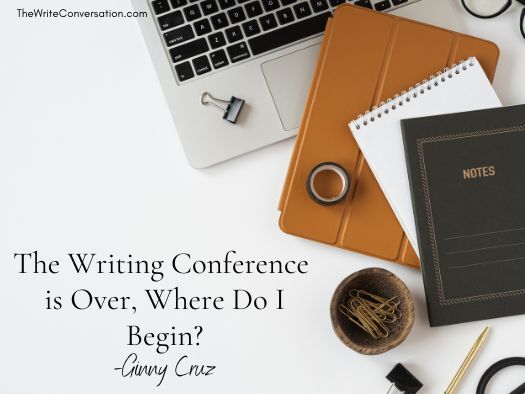
by Ginny Cruz, MPA, PT
You are back home after an exhilarating writers' conference. Colorful business cards from new friends litter your desk. A ton of class notes await your review. And if you are like me, your head spins with all the to-dos. Where do I begin?
Having attended many writers' conferences, most recently the Blue Ridge Christian Writers Conference, where I met many first-time conference attendees, God whispered that I should share some encouragement this month on how to move forward after a conference. Because, let's face it, all those ideas sounded doable while you sipped coffee and chatted with fellow writers. But when you are alone at your desk, it can be hard to know where to start.
Begin With Prayer
One of the most valuable pieces of advice that I have received over the years was offered by Eva Marie Everson, CEO of Word Weavers International , my favorite writers' critique organization. She advised going home and “doing nothing” for about a week. Let your mind and body rest. Begin the second week by praying about the next step to take. Another seasoned writer told me that he put all the business cards and notes face down on the bed. Then he prayed over them, asking God to show him which item to turn over first.
Whatever works for you, the important thing is to begin somewhere. You cannot do everything, and much of it is unnecessary at this stage of your writing journey. For example, I learned a great deal of valuable information about Amazon marketing from Vincent B. Davis, II. All of it is fabulous, but my book won’t hit the shelves for many months. When my book is published, I will need his information.
Last year, I took Edie Melson's class on blogging. Each time I blog, her information is helpful. Information on being interviewed comes in handy when those interviews are coming up. Until then, God has me honed in on writing articles and editing my upcoming book. That is where my focus lies. Ask God where you should begin.
An (Almost) Unbelievable Fact
Did you know that the vast majority of writers who receive invitations to submit work to an agent, editor, or publisher fail to send it? I find that fact almost unbelievable; however, experts confirm it is true.
If you were fortunate enough to receive an approving review and were offered the opportunity to submit something, please send it in. God has opened the door.
If I have learned anything on this writing path, it is the call to be obedient. There are no guarantees of worldly success or awards. God calls us to write and share the words He has given as far and wide as possible. So, send your work promptly and follow all directions carefully.
Follow His Light
The writing path is dimly lit, filled with twists and turns, and poorly marked. All you carry on this path is a lantern (God's word) and your desire to please Him with your work. That lantern provides the only light you have to illuminate your steps. The way forward contains no flashing neon signs saying, "Walk this way!" No, there is just enough light to see your next step.
A wonderful verse to meditate on is, “Your word is a lamp to my feet and a light for my path.” Psalm 119:105 NIV. As you sit and ponder where to begin, go to God and soak in his words. Those words will light your path forward, one step at a time. Finally, know this: He will guide you, but will not make you take that next step. He will walk alongside you as you walk, but you must do the walking. Begin your path forward, and as you take each step, know that God is with you every step of the way.
What are some ways you get going after a writers’ conference?
TWEETABLEThe Writing Conference is Over, Where Do I Begin? Insight from Ginny Cruz on @EdieMelson (Click to Tweet)
 Ginny Cruz, MPA, PT is a pediatric physical therapist, early intervention specialist, and award-winning author. Her writing encourages and teaches moms simple and effective ways to help their baby meet developmental milestones. In addition to writing, she enjoys hiking, reading, and camping with her husband. Find out more at ginnycruz.com and Instagram.
Ginny Cruz, MPA, PT is a pediatric physical therapist, early intervention specialist, and award-winning author. Her writing encourages and teaches moms simple and effective ways to help their baby meet developmental milestones. In addition to writing, she enjoys hiking, reading, and camping with her husband. Find out more at ginnycruz.com and Instagram.
Published on July 06, 2025 22:00
July 5, 2025
Spiritual Practices for Writers: The Practice of Proclaiming for Writers
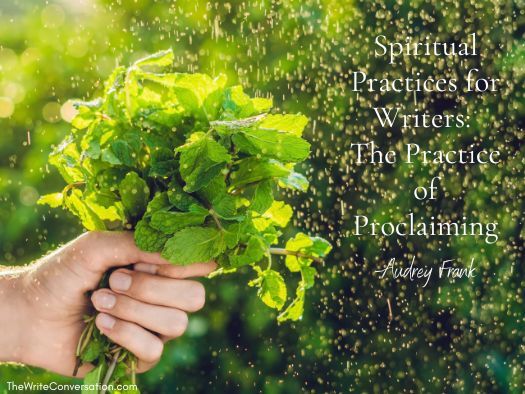
by Audrey Frank @AudreyCFrank
For what we proclaim is not ourselves, but Jesus Christ as Lord, with ourselves as your servants for Jesus' sake. For God, who said, "Let light shine out of darkness," has shone in our hearts to give the light of the knowledge of the glory of God in the face of Jesus Christ (2 Corinthians 4:5-6, ESV).
Like the slow start of a rollercoaster groaning up the first rise, the mint man's voice began. Basal and resonant, it clicked, rolled, and climbed until it reached a crescendo and flew high and sweet through the air.
Eeeeeeeeeeee-yeppp! Naaaaaaaaaa-a'nahhhhh!
Squeals of laughter rang out as my two little boys clamored to put on their slippers and run into the street to catch the mint man. His humble cart was laden with fresh, fragrant bunches of emerald-green mint. We could not have tea without it.
The mint man was one of a long line of proclaimers. He nobly listed more than ten generations of proclaimers, ending with a twinkle as he proudly introduced his successor, a little boy who followed shyly behind. The mint man's houseful of daughters did not break the ancestral chain—instead, the oldest gave him a grandson to carry on the tradition.
We never lacked mint, thanks to our faithful proclaimer.
I sometimes wonder if we writers are not like the mint man, wandering the streets of the earth shouting the Master Refresher's invitation to all who are thirsty. Along we go, day after day, pulling our cart of words, proclaiming, Jesus, He is the Lord! Come one, come all, taste, and be refreshed!
Not everyone came running to the mint man's cart, but that didn't stop him. I could set my watch by him every morning. Around that cart, I made new friends—fellow thirsters like myself—those who delighted in the fragrance of the proclaimer's offering as the cool morning breezes scurried through the winding ancient streets before the Sahara heat could catch them.
If he'd been selling mud, I doubt we would have come.
But he was proclaiming refreshment, fellowship, and life. And we wanted that every day.
The world is thirsty, and our cart of words can bring the refreshment it needs. If I proclaim myself, they'll grow thirsty again. But if I proclaim Jesus as Lord, they won't only be renewed; they just might become cart-pullers, too.
Now, wouldn't that be rejuvenating? A world of cart pullers, proclaiming Jesus Christ as Lord, the Refresher of our souls.
Lord, I will practice proclaiming You to the thirsty. Use my words to refresh the nations. Amen.
TWEETABLESpiritual Practices for Writers: The Practice of Proclaiming from @AudreyCFrank on @EdieMelson (Click to Tweet)
 Audrey Frank is an author, speaker, and storyteller. The stories she shares are brave and true. They give voice to those whose words are silenced by shame, the hard things in life that don’t make sense, and the losses that leave us wondering if we will survive. Audrey and her family have spent over twenty years living and working among different cultures and world views, and she has found that God’s story of redemption spans every geography and culture. He is the God of Instead, giving honor instead of shame, gladness instead of mourning, hope instead of despair. Although she has three different degrees in communication and intercultural studies, Audrey’s greatest credential is that she is known and loved by the One who made her.
Audrey Frank is an author, speaker, and storyteller. The stories she shares are brave and true. They give voice to those whose words are silenced by shame, the hard things in life that don’t make sense, and the losses that leave us wondering if we will survive. Audrey and her family have spent over twenty years living and working among different cultures and world views, and she has found that God’s story of redemption spans every geography and culture. He is the God of Instead, giving honor instead of shame, gladness instead of mourning, hope instead of despair. Although she has three different degrees in communication and intercultural studies, Audrey’s greatest credential is that she is known and loved by the One who made her.Audrey is the author of Covered Glory: The Face of Honor and Shame in the Muslim World (Harvest House Publishers), an outpouring of Audrey’s heart to introduce others to the God of Instead. Shame is not unique to the developing world, the plight of the women behind veils, young girls trafficked across borders; shame is lurking in hearts everywhere. Through powerful stories from women around the world, Covered Glory illuminates the power of the Gospel to remove shame, giving honor instead. Available at favorite booksellers: BARNES & NOBLE, BOOKS A MILLION, AMAZON.
Published on July 05, 2025 22:00
July 4, 2025
Is Finding Your Writing Comfort Zone Truly Necessary?

by Tim Suddeth @TimSuddeth
Virginia Woolf famously declared that a woman needs a room of her own if she’s to write fiction. I’m discovering the truth in that statement. My wife recently cut back on her work, which means she’s at home more. A good thing. But her mother and our son are already at our house most of the time. And with construction going on behind our house, it’s difficult to find the quiet time I need to concentrate on writing.
So, I’m venturing away from home these days to find a place where I can work comfortably. I didn’t realize it would be so difficult. I thought I’d only need a chair and a table. An outlet for the laptop. Maybe Wi-Fi. A nearby bathroom is a must. It’s the middle of summer here in South Carolina, so air conditioning is mandatory. Food, snacks, and drinks are important if I’m to write for longer than fifteen minutes.
I’ve tried some nearby places. I love our new library but, honestly, it’s too libraryish. Yesterday, I went there and worried about taking in my drink. Shh. No one said it but I worried about bothering anyone by talking or being too noisy. It’s a great place, but not a place where I can relax. And all those books. They called out to me to take them home.
I’ve tried the nearest Starbucks. That’s the go-to-place for many of my friends. But ours is one large room with floor-to-ceiling windows on the sunny side. Too bright, too open, and too loud. And I’m too much of a people watcher to get anything done.
The search for that ideal writing spot is harder than I thought.
But it isn’t just a comfortable physical place writers need, is it? We also need to find the emotional space we need to work. Life gets complicated and uncomfortable. I know all of you can make a list of the noise and distractions that are going on in your lives. Saying buckle up and get through it is simplistic at best and really just plain rude. Many of us are going through stuff we shouldn’t laugh off. It’s real. I understand. It’s part of life where illness, death, war, pain, broken friendships happen to everyone every day. Just because someone else has it worse doesn’t mean your pain, or my pain isn’t as important.
It's strange that the emotions of life make it difficult to write. Yet writing is a way to deal with those same emotions and problems. And going through trials gives our stories the edge, the reality our readers want.
Another obstacle to writing has just jumped onto my chest. My cat thinks it's time for her nap, and my chest seems to be her chosen place.
I may be spending too much time hunting for the ideal writing spot. I know some mothers who wrote with their laptops set against the steering wheel of the family van while their kids practiced sports. Some writers got up two hours before they have to get their kids ready for school to work on their stories. Others stayed up until after midnight so they could write when the house was quiet and everyone else was asleep.
Maybe searching for the ideal spot with all the comforts and none of the distractions isn’t the best use of my time. Although sitting under a shade tree writing on a deck next to a lake with just a hint of breeze does sound nice.
And maybe, waiting until life settles down and my health and my family and the world stop acting out of control. The thing is, our lives will always have ups and downs, twists and turns. We only have the impression that we are in control. God didn’t promise us a smooth journey. He does promise he will always be with us.
I think that’s one reason our stories can resonate so well with our readers and other writers. It isn’t that we have everything together or live lives isolated from the trials and troubles that others have. But it’s that we don’t let them stop us. We may have to take a break from our writing from time to time, but we always find ourselves back in the chair with a pen in our hands or a laptop on our, uh, laps.
We’re writers. Whether we do it for a check, to teach a lesson, or to share our family history we write for the pleasure of writing. It can be and often is frustrating. And we may think about quitting and sometime will. But we return. We’re writers. And we work for the prizes of writing those two words, the end, or hearing from a reader, oh, I get that.
And if you’re a writer you understand.
TWEETABLEIs Finding Your Writing Comfort Zone Truly Necessary? Insight from @TimSuddeth on @EdieMelson (Click to Tweet)
 Tim Suddeth is a stay-at-home dad and butler for his wonderful, adult son with autism. He has written numerous blogs posts, short stories, and three novels waiting for publication. He is a frequent attendee at writers conferences, including the Blue Ridge Mountain Christian Writers Conference and a member of Word Weavers and ACFW. He lives near Greenville, SC where he shares a house with a bossy Shorky and three too-curious Persians. You can find him on Facebook and Twitter, as well as at www.timingreenville.com and www.openingamystery.com.
Tim Suddeth is a stay-at-home dad and butler for his wonderful, adult son with autism. He has written numerous blogs posts, short stories, and three novels waiting for publication. He is a frequent attendee at writers conferences, including the Blue Ridge Mountain Christian Writers Conference and a member of Word Weavers and ACFW. He lives near Greenville, SC where he shares a house with a bossy Shorky and three too-curious Persians. You can find him on Facebook and Twitter, as well as at www.timingreenville.com and www.openingamystery.com.
Published on July 04, 2025 22:00



